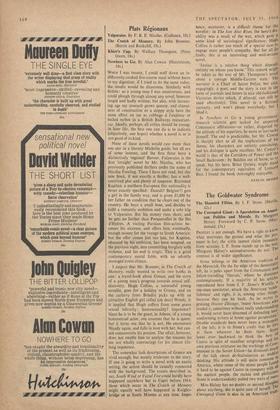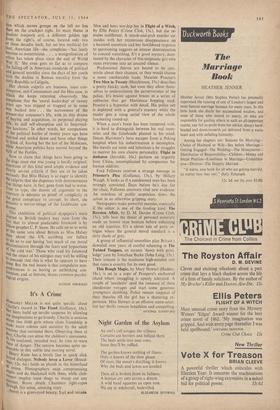The Goldwater Syndrome
PROTEST is not enough. We have a right to know what motivates the protest and what the Po" tester is for; the critic cannot claim immunity from scrutiny. I. F. Stone stands up to the test; Margaret Halsey's animadversions do not. The contrast is of wider significance. Stone belongs to the American tradition of the Maverick. On the far edge of the democratic left, he is poles apart from the Communists and fellow-travelling 'liberals,' whom he dismisses contemptuously. If a majority of his articles reproduced here from I. F. Stone's Weekly, a one-man newsletter, attack the American 'estalr lishment' and right, it is, among other things, because they can hit back. As he writes in praising Doctor Zhivago, 'many Americans who lauded it, sometimes without really understanding it, would never have dreamed of defending non; conforming writers at home against persecution. Double standards have never been a monopolY of the left; it is to Stone's credit that he tilts at them wherever he finds them. Stone leans over backward to think the best of Castro in spite of manifest misgivings and his own previous strictures on the workings of Con?' munism in the Soviet Union—he dismisses much , of the talk about de-Stalinisation as wishful thinking. His attitude is still quite common to America, where some of the nicest people foul; it hard to be against Castro in company with a the nastiest people, the racists and philistines. Stone is understandably pulled two ways at once: Miss Halsey has no doubts or second thougl;ts about anything; she is quite sure of herself. r,fif Corrupted Giant is ftlso in an American traut. Con Which moves groups on the left no less than on the crackpot right. Its main theme is laudans temporis acti, a different golden age from the right's, of course, located only two or three decades back, but no less mythical for that. American life—she complains—`has lately become so meretricious . . . a mongrelisation of ethics has taken place since the end of World War II.' She even goes •so far as to compare the falling-off in American standards of political and general morality since the days of her youth with the decline in Roman morality from the early Republic to Caligula. Her chosen culprits are business, mass con- sumption, anti-Communism and the Hiss case, to Which she keeps returning obsessively. She Complains that the 'moral leadership' of twenty Years ago 'was tripped or trapped or in some way backed into . . . the narrowness of the Present-day consumer's life, with its tiny drama of buying and acquisition, its perpetual playing safe, its dull self-absorption and its fingernail- slze horizons.' In other words, her companions of the political battles of twenty years ago have Married and settled down and have other things to think of, leaving her the last of the Mohicans, While American politics have moved beyond the style of the Forties.
„ Now to claim that things have been going to "le dogs since one was young is hardly original; assertions of this kind need ample evidence and Clearly set-out criteria if they are to be taken seriously. But Miss Halsey is so eager to identify the culprits that she dispenses with demonstration „that things have, in fact, gone from bad to worse. true to type, she damns all argument to the contrary in advance as proof of complicity in the great conspiracy to corrupt. In short, she Presents a mirror-image of the Goldwater syn- drome.
This exhibition of political dyspepsia's main interest to British readers may stem from the fact that its almost predictable foreword is by ?allow-prophet C. P. Snow. He calls on us to write tli the same vein about Britain as Miss Halsey A "...°es about the US, ascribing our failure to do so to our having 'lost much of our moral discrimination through the fears and hypocrisies of the cold war.' Those who read his foreword ;11:1 the object of his eulogies may well be willing concede that this is what he appears to have done. But the real lesson is that compulsive non- c°11formism is as boring as unthinking con- formism, and, at bottom, shares common psycho- 'Veal origins.
ALFRED SHERMAN































 Previous page
Previous page